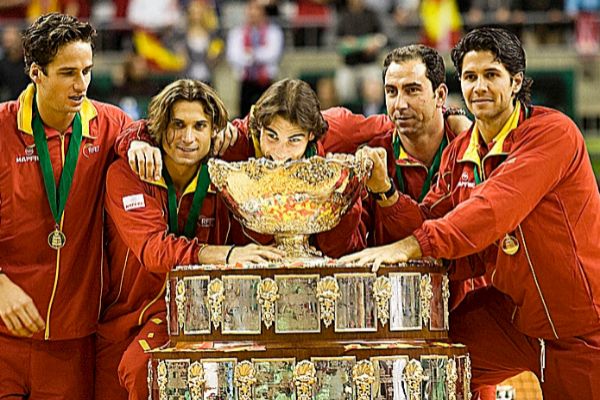Spain already has six Davis Cups . Six salad bowls raised to the sky. From that decisive game of Juan Carlos Ferrero in Sant Jordi in the year 2000, to the victory achieved this Sunday against Canada, at the premiere of the new format devised by the company Kosmos de Gerard Piqué. The Navy has added six titles in 19 years. A powerful feat. As it was said, it all started at the Palau Sant Jordi in Barcelona . Albert Costa, Alex Corretja, Juan Carlos Ferrero and Joan Balcells formed the team that would play the final against Lleyton Hewitt's Australia on clay. And it was the Spanish number 1, Ferrero, responsible for getting the decisive point in the fourth game (3-1).
In a very tense encounter, in which the Australian player lost the forms several times - he smashed a racket against the floor -, the Valencian kept his head cool and took the win in four sets (6-2 7-6 ( 5) 4-6 6-4), adding the first salad bowl for the Spanish team. The second came four years later, in 2004, with a teenage Rafa Nadal. The United States came to Seville with a real team: Andy Roddick, Mardy Fish and the Bryan twins. 25,000 people packed the Cartuja in an unprecedented environment. "I had never experienced anything like that," Moya acknowledged at the foot of the track, cheered by a dedicated audience.
The Spanish captains (Jordi Arrese, José Perlas and Juan Bautista Avendaño, the so-called G3), surprised giving Nadal the responsibility of playing the first point, leaving Juan Carlos Ferrero in the bank. A controversial decision that went perfectly. The very young 18-year-old Manacori beat Roddick on Friday; and Spain would close the tie with Moyá's racket in the fourth game, again against a Roddick who counted all his matches for defeats.
Without a doubt, the most meritorious victory came in 2008. For three reasons: the place, Mar del Plata (Argentina), before the hostess; Nadal's absence, exhausted by the tight calendar of that season; and the hard surface, very harmful for the Spanish game. The national team, led by Emilio Sánchez Vicario, was formed by David Ferrer, Feliciano López, Fernando Verdasco and Marcel Granollers. Spain had never won the Davis Cup at home and attended the event as a cover, without its main star. The Argentine team was, by far, the clear favorite. David Nalbandián, Juan Martín del Potro, Agustín Calleri and José Acasuso integrated that quartet that ended up decomposing due to internal disputes in a fast-paced weekend.
Given the injury of Juan Martín del Potro, Acasuso was chosen to dispute the fourth point and was overcome by a colossal Verdasco, surviving the hellish environment proposed by the Argentine fans. In five sets (6-3, 6-7 (3), 4-6, 6-3 and 6-1), Spain won its most precious Davis Cup. The Navy did not suffer so much only one year later. The return of Nadal raised Spain towards its most comfortable victory. A 5-0 against the Czech Republic, in a final that was played again in the Palau Sant Jordi. David Ferrer ran the tie in the second point, after Nadal overwhelmed Tomas Berdych. He raised two sets against Radek Stepanek in the second point; so that later Feliciano and Verdasco sealed the victory in the doubles.
The last one, before yesterday's victory at the Caja Mágica, took place in 2011. It was held again in Seville, at the Cartuja stadium, again against Argentina and with the same quartet: Feliciano López, Fernando Verdasco, David Ferrer and Rafa Nadal. It was, of course, Nadal who closed the fifth Salad Bowl. In the fourth point, after the fall in the doubles, the best Spanish tennis player of all time began hesitantly against Del Potro (1-6 in the first set), but signed an outstanding comeback (6-4, 6-1 and 7-6 (0)). The relationship between number 1 and the Davis Cup, started in 2004, remains indestructible. From La Cartuja to the Magic Box.
According to the criteria of The Trust Project
Know more- Rafael Nadal
- Gerard Piqué
- tennis
- Davis cup
Davis Cup Spain is Nadal
DavisNadal Cup joins complaints about schedules: "They are bad for tennis players and fans"
Davis Cup The Piqué revolution takes off in the Magic Box

